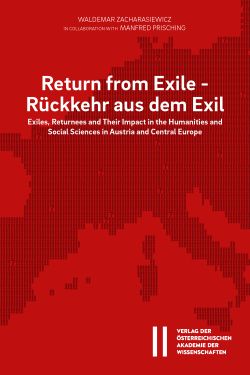
Der gewaltige Schaden, den die Geistes- und Sozialwissenschaften im 20. Jahrhundert dadurch erlitten, dass tausende Wissenschaftler und Künstler aus Österreich und Mitteleuropa vertrieben wurden, ist bereits eingehend dargestellt worden. Der vorliegende Sammelband widmet sich dem noch nicht ausreichend behandelten Thema ihrer Rückkehr. Er verbindet Analysen der bürokratischen Hürden und der ideologischen Vorbehalte, auf die zur Rückkehr bereite Exilanten stießen, mit Untersuchungen der unterschiedlichen Möglichkeiten einzelner Remigranten, die Entwicklung ihrer verschiedenen Disziplinen nach dem Ende der Nazi-Diktatur zu beeinflussen. Die 27 Aufsätze beleuchten die bedeutende Rolle von Rückkehrern als großherzige Mentoren von jüngeren Wissenschaftlern und bei der Modernisierung und Internationalisierung der Universitäten, an denen Stillstand und eine provinzielle Sicht vorherrschten. Prominenten Historikern, Philosophen und Politikwissenschaftlern wurden ihnen angemessene akademische Stellen verweigert, obwohl sie sehr wichtige Initiativen entfalteten, während zurückgekehrte Theaterleute relativ großen Einfluss auf die Programmgestaltung der Theater und auf andere Medien hatten. Der Sammelband hebt auch persönliche Fakten hervor, wie z. B. das verständliche Zögern prominenter Persönlichkeiten wie Oskar Morgenstern oder Ernst Krenek, die Vorzüge einer US-amerikanischen Staatsbürgerschaft für eine akademische Stelle in einem Land aufzugeben, das den Bedrohungen in der Zeit des Kalten Krieges ausgesetzt war. Die Aufsätze belegen aber auch, dass nicht wenige unter den Emigranten auf beiden Seiten des Atlantiks Fremde blieben. Eine Stärke des Bandes liegt in der Darstellung des Schicksals und des Einflusses der hohen Zahl von ins Exil gegangenen österreichischen Wirtschaftswissenschaftlern. Viele von ihnen kehrten aus dem Exil in Großbritannien zurück und prägten die Entwicklung der ökonomischen Theorie und der Wirtschaftspolitik, meist von außerhalb der Universitäten, während viele nach Übersee Ausgewanderte oder Vertriebene in den USA blieben.
…
The tremendous loss to the humanities and social sciences in the 20th century resulting from the expulsion of thousands of scholars and artists from Austria and Central Europe has been well documented. The present collection of articles deals with a related but under-researched aspect – it combines analyses of the complex bureaucratic and the ideological obstacles which exiled scholars from a wide range of disciplines in the humanities and social sciences and creative artists faced when they were willing to return and specific essays documenting the varying opportunities for individual returnees to influence the development of their different disciplines after the end of the Nazi tyranny. The 27 essays highlight the roles of a number of returnees as generous mentors for younger scholars and their encouragement of modernization and internationalization in an atmosphere of stagnation and provincialism in the universities. Eminent experts in history, philosophy or political science who had returned were hampered by the denial of full academic appointments despite their highly stimulating initiatives, while theatre directors had a relatively strong impact on the programs in the theaters and the other media. The volume also illustrates personal factors, including the understandable hesitation of prominent intellectuals such as Oskar Morgenstern or Ernst Krenek to give up the advantages of US American citizenship for academic positions, especially in a country exposed to political threats in the Cold War; but the essays also bring out the fact that quite a few of the émigrés remained exiles on both sides of the Atlantic. A particular strength of the volume is the detailed consideration of the fortunes and the influence of the impressive array of exiled Austrian economists. Many of them returned from Britain, helping to shape economic theory and Austrian economic policy, even though necessarily mainly from outside the universities, while transatlantic exiles largely remained in the USA.
2017,
978-3-7001-8068-5
978-3-7001-8245-0
496 Seiten, broschiert,
22,5x15cm